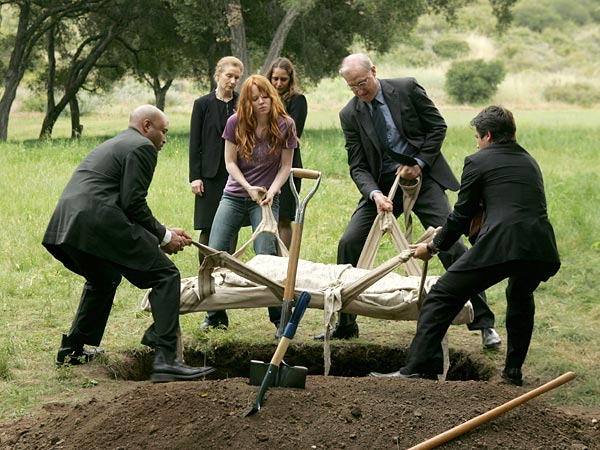Whatever the case may be, they had a quote from Alan Ball saying that one reason he saw for this was that so many gay films tended to be about issues (AIDS, coming out, discrimination), and that being gay was the main thrust (ahem) of the story. Whereas on television, you have hours and hours and hours to slowly and subtley reveal a character's true, well, character, and make relationships so much more nuanced and realistic.

This is what drew me into television to begin with, and why I think really incredible television shows have pretty much killed my love of movies. Anymore, 2 hours simply isn't enough time for me to invest in characters that I like. I've never been terribly interested in plot, which could explain why I generally hate mysteries, thrillers, and action films. A good story is nice, but I enjoy television and film for the characters and the richness and intimacy that watching people develop over years can bring you.

All of my favorite shows (Sex and the City, Six Feet Under, Nip/Tuck, Friday Night Lights) have all been character-based, and about extraordinarily complex and nuanced characters (well, maybe not Sex and the City so much, and only the first 2 seasons of Nip/Tuck; seasons 3 and 4 got very plotty and stupid and totally sucked). And not only that, they've all been set in very specific "worlds" (high-fashion New York; a funeral home; a high-end cosmetic surgery hospital; small-town Texas) that generally have very prescribed ideas about how things should be, and all feature characters either creating or breaking those molds and boundaries. So, in another sense, I guess all of those shows have also been about identity and defining oneself within the confines of whatever world it is the characters are existing in.

With movies everything has to be so glossed over, so quick, so surface. With television shows, relationships can begin and end in real time; people can grow up, or change, in such slow and realistic ways, that when you go back and visit them again at the beginning of whatever show it is compared to the end of the show, you can really see the progress and change, whereas you might not have really noticed it while watching the show. In TV shows, characters don't have to have revelatory epiphanies and a conclusion like they do in movies. That's not real life. I'm not knocking movies here, I'm simply saying for my money, movies just don't cut it for me anymore. I like to be able to grow with my characters and become intimately involved in their lives. (To this day, I still maintain that I've never seen a movie that can rival Six Feet Under for me.)

Which goes back to Alan Ball's comment. A lot of emphasis in the gay rights movement has been placed on being "out" and visible, and how that, more than anything, has helped the cause. Because the more people that know gay people, and realize that they're not all AIDS victims, or serial killers, or political activists, the more the regular population will see them as just being regular people. If a middle-aged soccer mom in Iowa who's never known a gay person can watch Six Feet Under and watch David struggle with his sexuality over 5 years, and become really attached to him, and the show can humanize this character and make the anxiety and fear of that struggle very real to this woman, in a way that a film never could (despite how great Brokeback was, it was still two very famous, heterosexual actors playing dress up, and that's impossible to forget while watching it), then I say, bring on the TV.
No comments:
Post a Comment